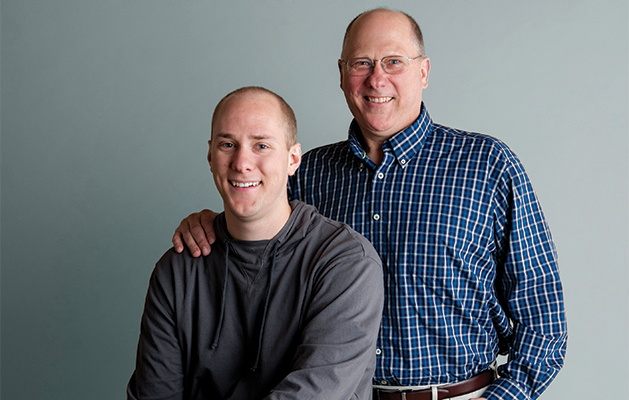
We hope tonight you’ll learn skills that you’ll never have to use,” says lead instructor Norm Okerstrom as he opens a Heart Safe Plymouth training session.
He then points out the importance of knowing how to perform CPR, how to use an AED (automated external defibrillator) and the signs and symptoms of cardiac arrest. With this information, anyone can have the knowledge and confidence to help save lives. In fact, it’s what saved Okerstrom’s own son’s life nine years ago. “The story is so important, it needs to be told,” he says.
When he was 16 years old, Teddy Okerstrom went into cardiac arrest at summer conditioning for football at Wayzata High School. Norm explains Teddy didn’t worry about dizziness while running sprints on the first day of practice – he was physically fit and thought he hadn’t had enough breakfast. But on the second day, Teddy collapsed on the field and began to turn blue.
Cardiac arrest – an abrupt loss of heart function – can be deadly, and the chance of brain damage increases with every second. It is usually caused by ventricular fibrillation, an abnormality in the heart’s electrical system. Luckily for Teddy, the staff at the scene recognized the signs of cardiac arrest and immediately began chest compressions and used an AED to revive his heart.
“It was teamwork at its finest,” says Ryan Johnson, physical education and strength coach at Wayzata High School. Johnson, along with coach Matt Lombardi and athletic secretary Dee Schroeder all knew what to do. “The AED is number one and you need to have people who know how to use it because it can save lives.”
Often seen in public places like shopping malls and schools, an AED is a portable electronic device that detects disturbances in the heartbeat’s rhythm. It then treats this through defibrillation and the application of electrical therapy, allowing the heart to reestablish an effective rhythm. “The heart is quivering and it’s not pumping properly. There’s no oxygen getting to the brain,” Norm explains.
“After one shock from the AED, his heart was defibrillated and he got back on track,” Norm says.
Teddy doesn’t remember the experience, but he says that when he became conscious, “it felt like a horse had kicked me in the chest 100 times … it was an eye-opening experience.”
After Teddy’s cardiac arrest, he spent six days in the hospital. Doctors weren’t able to determine the cause. He was no longer able to play football, but he continued to be involved with the team and was able to play basketball about five months later.
“It’s been eight and a half years now and it hasn’t had a negative effect. I’m really grateful to be alive. It really renewed my faith. I give all the credit to God. I’m just looking forward to what the future brings,” says Teddy, who is studying education at North Central University in Minneapolis.
After this traumatic experience, Norm says he couldn’t stay on with his business selling promotion products. His faith helped him find the good in the situation and he became involved with Parent Heart Watch, a national non-profit dedicated to protecting kids from preventable sudden cardiac death. The group was founded in 2005 by four mothers who lost their children to an undetected heart condition. The organization helped the family find support and there, Teddy met another survivor who had a cardiac arrest just two weeks before he did. The two remain friends today.
Norm also became an American Heart Association instructor, which led to his role in Heart Safe Plymouth. He also sells AEDs as an independent representative.
Although sudden cardiac arrest is rare in children, it can affect anyone, even those who are physically fit like Teddy. Each year, sudden cardiac arrest claims the lives of over 9,500 children and adolescents in the U.S. and accounts for about 3 to 5 percent of all deaths in children aged 5-19 years.
A Heart Safe Community
Since the one-hour bystander Heart Safe training began in 2012—sponsored by the Rotary Club of Plymouth and the Plymouth Public Safety Department—more than 5,000 Plymouth residents and business people have been trained, with a goal of reaching 7,000.
Plymouth was named a Heart Safe Community in 2013 by the American Heart Association. The program recognizes efforts by individual communities to improve their system for preventing deaths caused by sudden cardiac arrest. Other sponsors for Heart Safe Plymouth include the Minnesota Department of Health, Allina Health and the MN Resuscitation Consortium.
“People have said, ‘I’ve had training before, but no one ever explained like they did today, so that I understand what I am doing and why.’ It has also opened the eyes of businesses to realize how important it is to have an AED unit available. People also mention wanting to bring the training team into their organizations or youth sports associations in their community,” says Jason Cardwell, president of the Rotary Club of Plymouth.
Before getting hands-on practice, Norm explains the difference between sudden cardiac arrest and a heart attack. Treatment for a heart attack generally involves medications or procedures to restore blood to the heart.
Once someone recognizes the signs of a cardiac arrest, CPR and an AED come into play. The class teaches adult hands-only CPR, a method using chest compressions without mouth-to-mouth breaths. Each participant practices on a CPR mannequin. Participants also learn how an AED works. Once the device is turned on, a voice and visual prompt guides the user, making it less intimidating to use. To end the session, the group simulated a cardiac arrest at the mall. Everyone took action: calling 911, finding the AED or keeping up the rate of compressions before the AED arrived on the scene.
“They made it so easy. I feel well-educated now. You may be less likely to jump in if you’ve never done it before,” says participant Mary Bildsoe.
If you suspect someone is suffering from cardiac arrest:
Heart Safe Plymouth
Adults and teens can register for a free session at rotaryplymouth.org. Businesses, groups and organizations can also schedule a free session by contacting heartsafeplymouth@gmail.com, calling CPR/AED instructor Norm Okerstrom at 763.238.8443 or visiting the Plymouth Rotary website.









